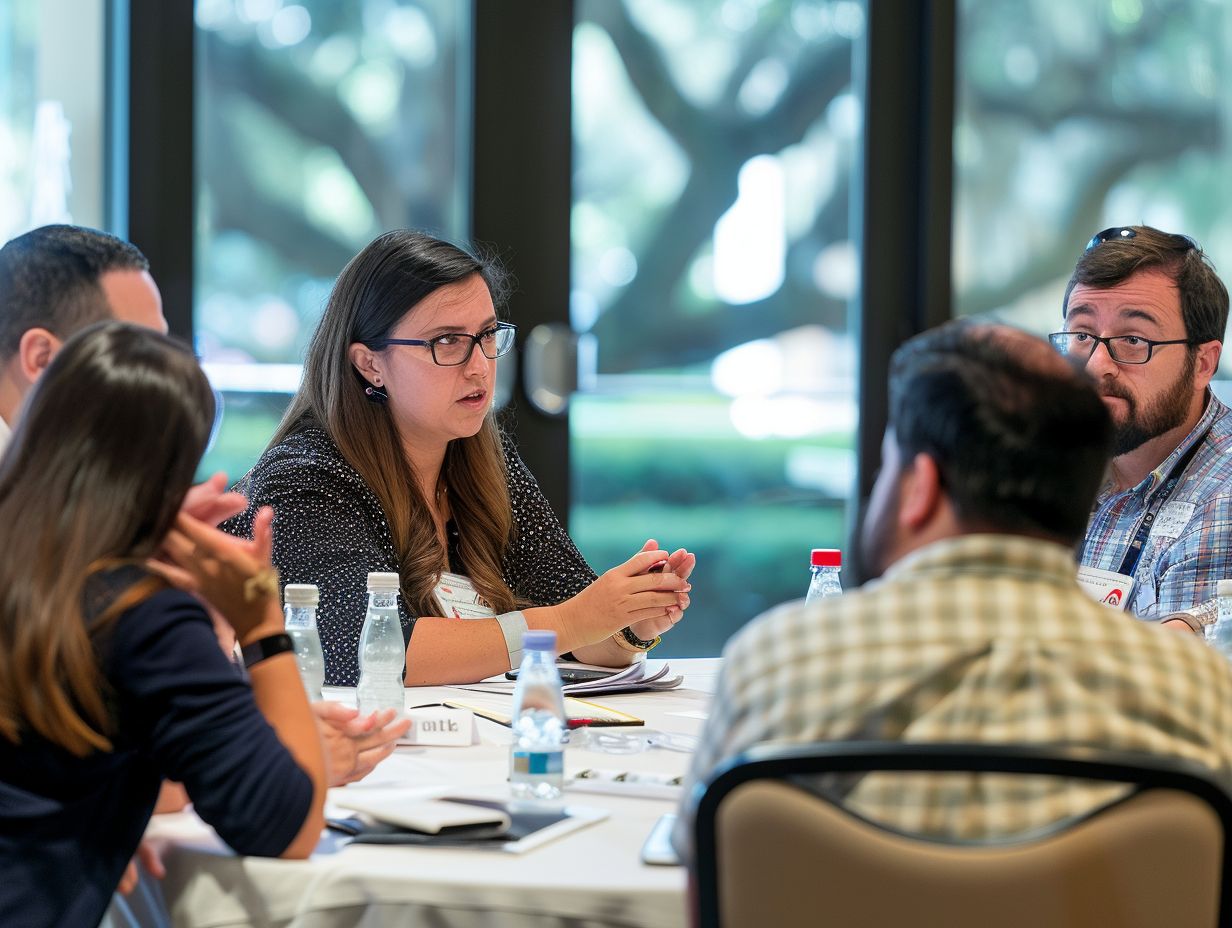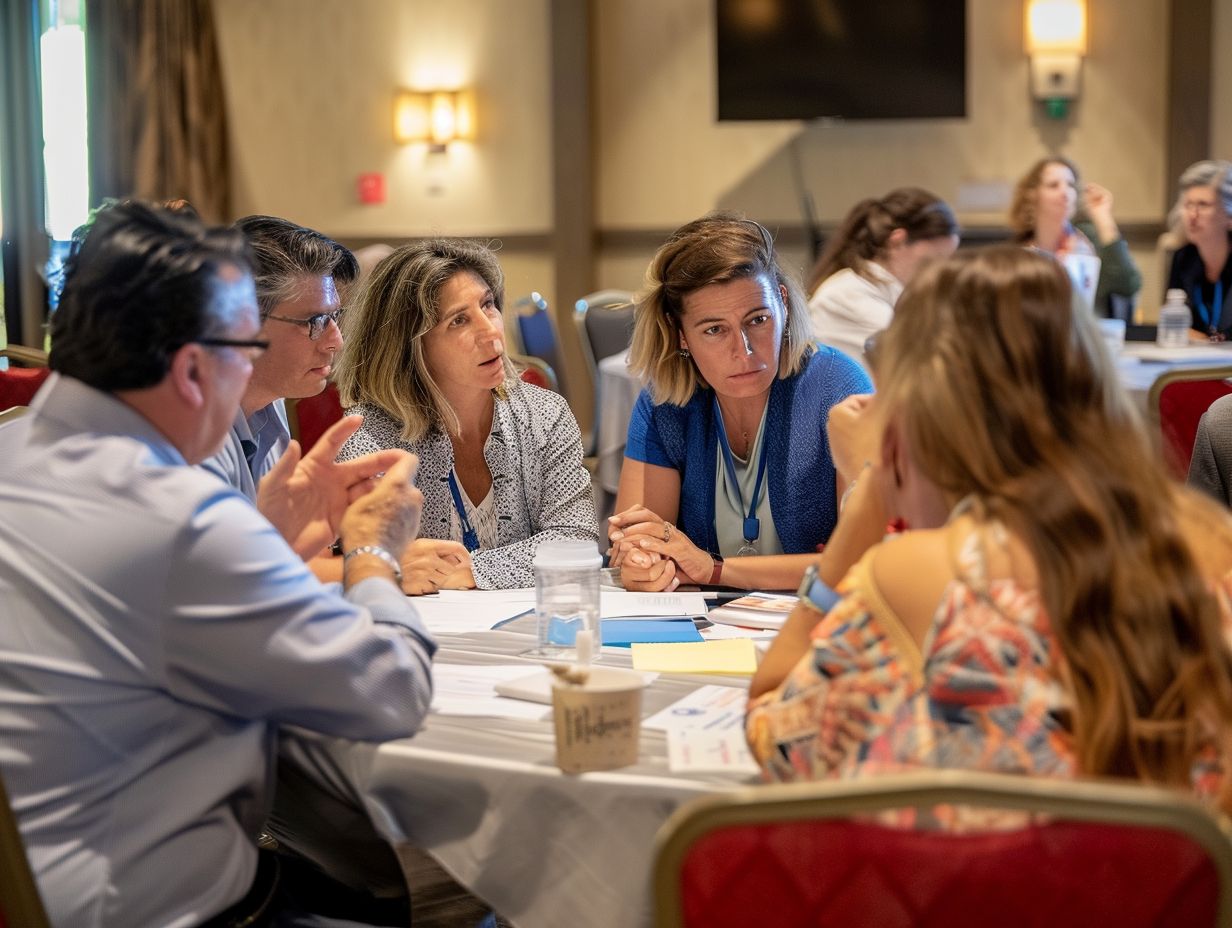Policy making is a crucial aspect of governance that shapes the laws and regulations that govern society. In Florida, policy making involves various key players, including the Governor, the Legislature, and lobbyists.
But what about the everyday individual? How can they make an impact on policy decisions in the Sunshine State? From contacting elected representatives to using social media to spread awareness, there are several ways for individuals to influence policy making in Florida.
We will explore some current policy issues in Florida, such as gun control, climate change, education reform, healthcare access, and criminal justice reform. Join us as we delve into the world of policy making in Florida and discover how you can be part of the process.
Key Takeaways:

- Individuals can influence policy making in Florida by contacting elected representatives, attending public hearings, joining advocacy groups, using social media, and voting in elections.
- The Governor and Florida Legislature play important roles in policy making, while lobbyists can also have significant influence.
- Current policy issues in Florida include gun control, climate change, education reform, healthcare access, and criminal justice reform.
How Can Individuals Influence Policy Making in Florida?
People in Florida have the opportunity to impact policy making by engaging in different forms of advocacy, including reaching out to elected representatives, attending community meetings, and contributing to the creation of public action plans.
1. Contact Your Elected Representatives
Reaching out to elected representatives is a direct method of expressing concerns and offering feedback on policy matters.
When contacting elected officials, clarity, conciseness, and respect in communication are essential. Adding a personal touch by sharing personal anecdotes or examples of how specific policies impact you or your community can enhance the effectiveness of your message.
Emphasizing solutions or alternatives rather than solely highlighting issues is recommended. By providing constructive feedback, individuals can play a role in influencing policy decisions positively and contributing to significant change.
It is important to recognize the significance of one’s voice and the potential impact of individual input on shaping the future.
2. Attend Public Hearings and Meetings
Engaging in public hearings and meetings is a useful approach for staying informed and increasing awareness about important policy matters.
By actively participating in these venues, community members are given the chance to voice their opinions, share their perspectives, and offer valuable feedback to policymakers. Public involvement is critical not only for influencing decisions that affect the community but also for fostering a sense of ownership and responsibility among residents.
When individuals take part in discussions and express their concerns, they contribute to a more open and inclusive decision-making process, leading to more responsive and effective policies. Additionally, public hearings and meetings act as forums for dialogue, cooperation, and collective problem-solving, enhancing community cohesion.
3. Join Advocacy Groups
Participating in advocacy groups can assist individuals in finding allies and developing strategies to influence policy making on issues important to them.
By engaging with like-minded individuals in advocacy groups, one can establish a strong support network that enhances their capacity to drive significant change. These groups often offer valuable resources like research findings, legislative updates, and communication tools, providing individuals with the necessary information to advocate effectively for their causes.
Being a member of an advocacy group enables individuals to participate in collective action and amplify their voices, increasing their visibility and impact on policymakers. Through collaborative efforts and strategic planning, members of advocacy groups can collaborate towards common objectives and address pressing societal issues more effectively.
4. Use Social Media to Spread Awareness
Social media serves as a potent tool for raising awareness about policy issues and garnering public support. Leveraging the broad reach and immediacy of platforms such as Facebook, Twitter, and Instagram enables advocates to effectively amplify their message to a large audience.
Engaging visuals, compelling storytelling, and interactive content have the ability to capture followers’ attention and motivate them to take action. Utilizing features like live streaming and hashtags allows advocates to connect with individuals who share similar concerns or interests.
Collaborating with influencers and other organizations can extend the reach of advocacy campaigns and build momentum. Through strategic planning and consistent engagement, social media has become an essential ally in advancing social change and influencing public opinion.
5. Vote in Elections
Participating in elections is a significant method for individuals to impact policy-making by selecting officials who share their perspectives and objectives for success. Through active involvement in the voting process, individuals possess the ability to influence the future trajectory of their communities and societies.
Choosing supportive officials can facilitate the adoption of policies that tackle urgent matters and instigate beneficial changes. When voters elect representatives who prioritize their concerns, they play a role in constructing a government that mirrors the unified will of the populace. This synchronization between voters and elected officials can lead to successful policy results that serve the wider population.
What Are Some Current Policy Issues in Florida?
Various policy issues in Florida cover a broad spectrum of topics such as gun control, climate change, education reform, healthcare access, and criminal justice reform, each necessitating specific regulations and solutions.
1. Gun Control
Gun control continues to be a topic of debate in Florida, with discussions revolving around laws and regulations designed to address gun violence.
The state currently enforces multiple gun control laws, such as requiring background checks for all firearm sales and implementing a three-day waiting period for handgun purchases.
There have been proposals for further actions, like closing legal loopholes that permit private sales without background checks. Advocates argue that stricter regulations are vital to prevent mass shootings and other instances of gun violence, while critics often reference Second Amendment rights and the importance of self-defense.
2. Climate Change and Environmental Protection
Climate change and environmental protection are prioritized in Florida, with action plans centering on sustainable practices and regulatory measures.
Current efforts in Florida involve implementing renewable energy incentives, promoting eco-friendly transportation options, and enhancing coastal resilience to address the impacts of climate change. Initiatives are in place to decrease carbon emissions, preserve biodiversity, and involve communities in conservation endeavors.
Future action plans are focused on bolstering renewable energy targets, boosting investments in green infrastructure, and partnering with stakeholders to create innovative solutions for a more sustainable future in the Sunshine State.
3. Education Reform
Education reform in Florida aims to enhance the quality of education by defining specific objectives and involving the community in the process. In this effort, policymakers are concentrating on introducing curriculum modifications that emphasize critical thinking and STEM education to enhance students’ readiness for the future job market.
Through community forums and outreach programs, stakeholders are urged to offer valuable feedback and assistance in molding the educational environment. Initiatives like mentorship programs, school collaborations with local businesses, and improved technology access are being implemented to boost educational results and guarantee that students in Florida possess the essential skills for success.
4. Healthcare Access and Affordability
Improving healthcare access and affordability is a significant policy issue in Florida, with officials working to develop solutions that ensure equitable healthcare for all residents.
Key challenges in this endeavor include disparities in healthcare coverage, limited access to essential services, and high out-of-pocket costs for many individuals.
Policymakers are collaborating with healthcare providers, insurers, and community organizations to implement measures such as expanding Medicaid coverage, increasing funding for rural clinics, and promoting telemedicine services.
By engaging various stakeholders and adopting innovative strategies, officials are striving to create a more inclusive and accessible healthcare system in the state.
5. Criminal Justice Reform
Criminal justice reform efforts in Florida are focused on addressing systemic issues within the justice system through targeted advocacy and strategic policy changes. This includes initiatives aimed at reducing mass incarceration, promoting alternatives to imprisonment for non-violent offenses, and enhancing access to rehabilitation programs for individuals involved in the criminal justice system.
Activists, community organizations, and policymakers are collaborating to advocate for legislative reforms that prioritize fairness, accountability, and equity in the treatment of marginalized communities.
Through grassroots campaigns, lobbying efforts, and public awareness campaigns, these stakeholders are driving momentum for change and raising awareness about the imperative for a more just and equitable criminal justice system.
Frequently Asked Questions
What is policy making and why is it important in Florida?
Policy making refers to the process of creating laws and regulations that govern a particular state or country. It is important in Florida because it helps shape the state’s future and impacts the lives of its residents.
How can I get involved in policy making in Florida?
There are several ways to get involved in policy making in Florida, such as attending public hearings, participating in community forums, contacting your legislators, and joining advocacy groups.
What are some key issues currently being debated in Florida’s policy making?
Some key issues being debated in Florida’s policy making include gun control, climate change, healthcare, education, and immigration.
How can I stay updated on policy making in Florida?
You can stay updated on policy making in Florida by following news outlets, subscribing to newsletters from advocacy groups, and regularly checking government websites and social media pages.
What is the role of lobbyists in influencing policy making in Florida?
Lobbyists are hired by organizations and interest groups to influence policy making in their favor. They use their knowledge and connections to communicate with legislators and advocate for their clients’ interests.
How can I make my voice heard in policy making in Florida?
To make your voice heard in policy making in Florida, it is important to educate yourself on the issues, stay informed, and actively engage with your elected officials through calls, emails, and meetings.

























Rate this article:
Average rating 0 / 5. Vote count: 0
No votes so far! Be the first to rate this post.
No Comments yet!